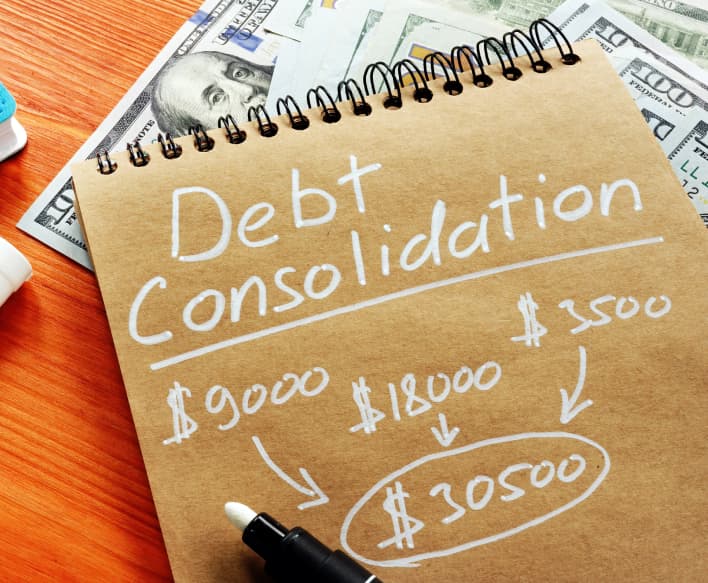
Everyone needs a little help wrangling their finances from time to time. With so many different bills, credit cards, and loans to worry about, keeping track of your bills and paying everything on time can be a tough task.
While you could try to repay individual bills or debts separately, there’s another potentially better option for paying off your debt: debt consolidation.
Debt consolidation loans are some of the best debt management tools available. These types of loans can help you manage multiple debts by combining several loan balances into a single new loan that’s far easier to repay.
So, just what are debt consolidation loans and why should you use them? Let’s break down both of these questions and more.

Debt consolidation is a debt management strategy that involves taking out a debt consolidation loan and using that cash to pay off other, separate debts. Using a debt consolidation loan, borrowers can more easily pay back larger amounts of debt than if they had to juggle multiple bills simultaneously.
So, where can you get a debt consolidation loan? Debt consolidation loans are offered by certain financial institutions such as Regional Finance.
In a debt consolidation loan, a borrower takes out a loan in an amount that totals several other existing bills. The new loan is used to pay back those separate debts to credit card companies or other lenders.
Here’s an example of how debt consolidation loans work:
A single consolidation loan simplifies your monthly bills, giving you peace of mind.
Debt consolidation loans are popular choices for folks who need a little help managing multiple bills for a variety of reasons. The benefits of debt consolidation loans include:

While debt consolidation can be an excellent choice for many, there are a few downsides to keep in mind as well.
Many debt consolidation or personal loans come with upfront costs, including loan origination fees and balance transfer fees. It’s important to check the terms of a debt consolidation loan just like you would with a regular loan.
Additionally, there’s no guarantee that a debt consolidation loan will have a lower interest rate than the interest rates of your other debts. You should read the fine print of a debt consolidation agreement before signing on the dotted line to make sure you’re getting a good deal.
Debt consolidation is not the only way to manage multiple bills or loans if you’re having a little trouble. After all, a debt consolidation loan may not be useful if you only have a single loan to pay off. There are other options that can help you in creating a debt management plan.
One of the most common alternatives to debt consolidation is credit card refinancing. If an individual has a credit card balance that is too tough to handle, they can try to refinance their card’s balance by transferring that balance to a new card.
In credit card refinancing, cardholders can move the balances from one or more other credit cards to a single credit card that has a zero interest “grace period.” During this grace period, the cardholder doesn’t have to worry about any interest accruing on the balance they put on the card. In most cases, the grace period is between 12 and 18 months.
Here’s an example of how credit card refinancing works:
There are a few downsides to credit card refinancing. For example, most cards that allow balance transfers incur transfer fees of between 3% and 5% of the total balance amount. In the above example, this would be between $36 and $50.
Furthermore, many cards that have zero interest grace periods also have high regular interest rates. To make the most of credit card refinancing, you must pay off your debts before the grace period ends. Because of this, credit card refinancing is only a good strategy if your credit card balances aren’t very high.
In the end, only you can decide whether a debt consolidation loan is the right choice for your unique financial situation and budgeting goals.
The information and materials provided on this website are intended for informational purposes only and should not be treated as an offer or solicitation of credit or any other product or service of Regional Finance or any other company. This website may contain links to websites controlled or offered by third parties. We have not reviewed all of the third-party sites linked to this website and are not responsible for the content, products, privacy policy, security, or practices of any linked third-party website. The inclusion of any third-party link does not imply any endorsement by Regional Finance of the linked third party, its website, or its product or services. Use of any third-party website is at your own risk.
References accessed on July 10th, 2021:
Credit.com – What Exactly is a Debt Consolidation Loan?
You can prequalify for your personal loan online in just minutes by clicking prequalify now. Or, if you prefer, call or stop by your local branch to get the process started. Our loan specialists can answer any questions you may have such as what a personal loan is, understanding personal loan interest rates, and how to qualify for a personal loan. We’ll help you fill out an application for the type of loan that fits your needs.